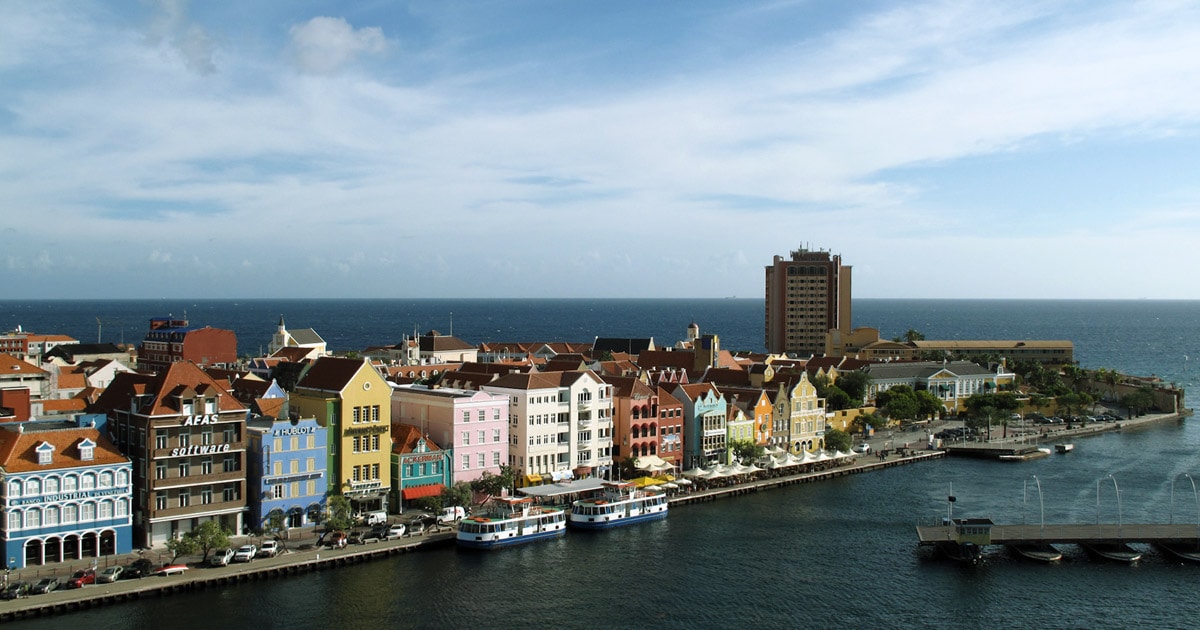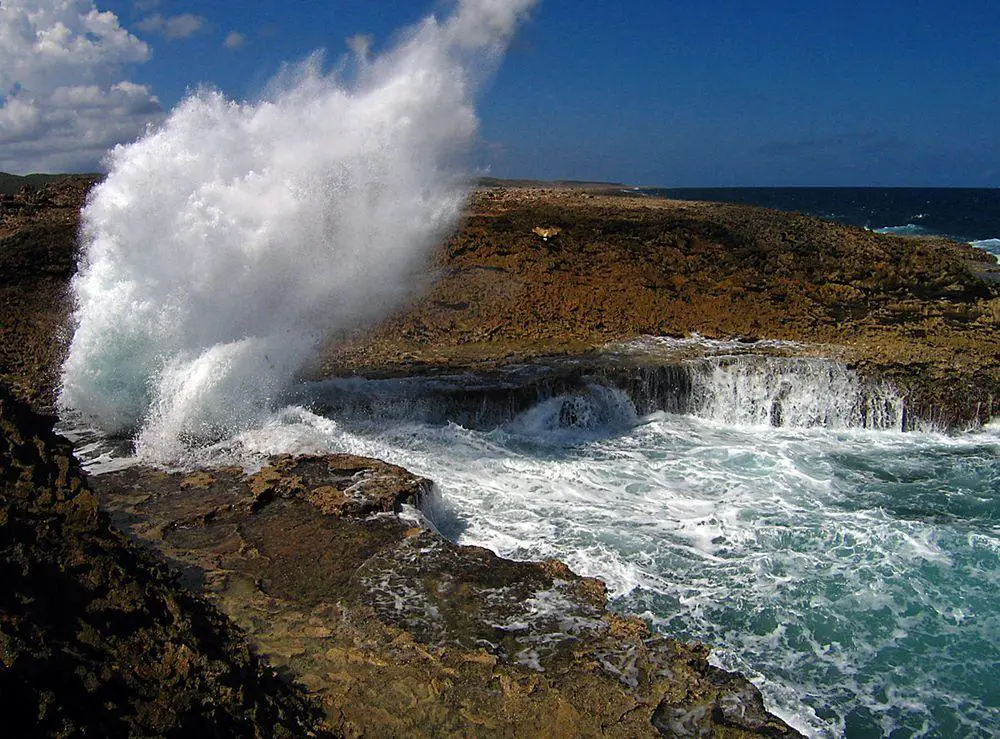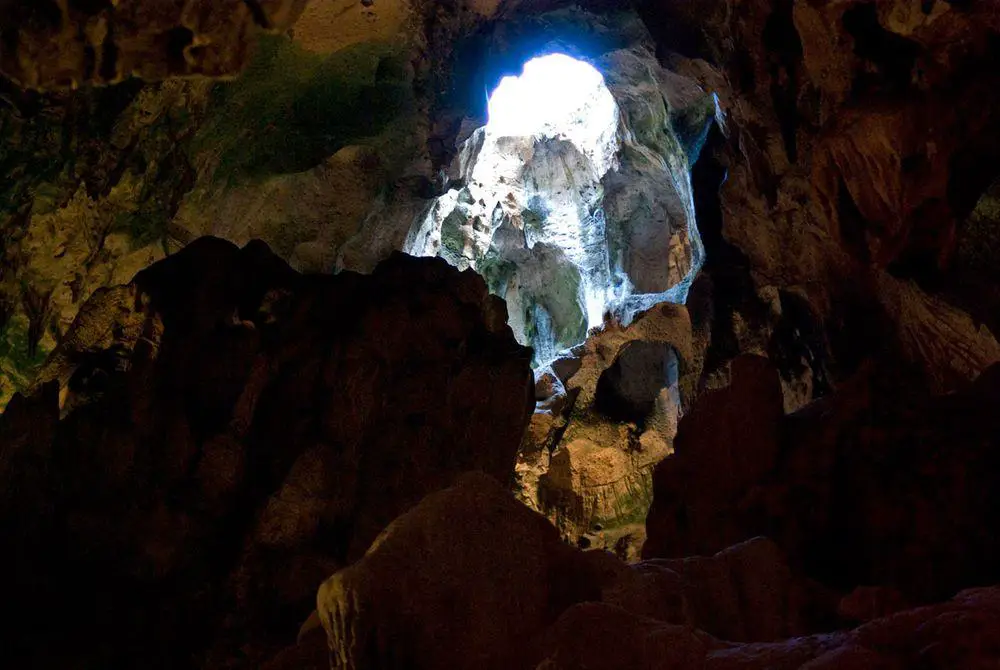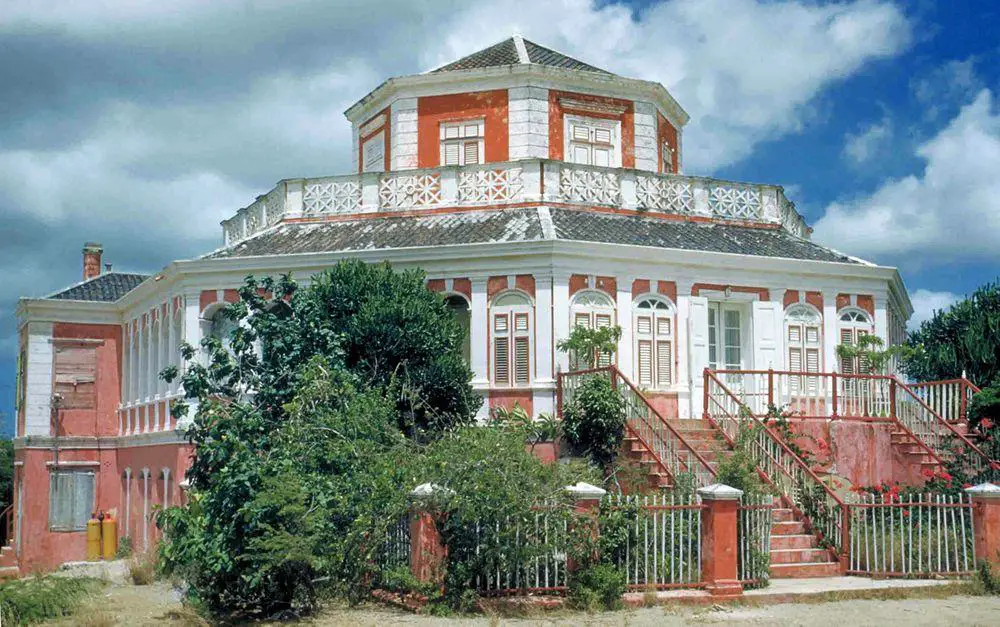Wondermondo 🢖 World 🢖 Wonders of North America 🢖 Wonders of the Caribbean 🢖 Wonders of Curacao
Territory
Wonders of Curacao

 Highlights
Highlights
Curaçao is one of the constituent countries of the Kingdom of the Netherlands and is located in the Caribbean region.
Contrary to most other Caribbean islands, Curaçao is very rich with architectonic landmarks. Historical districts of the capital Willemstad are rich with amazing, nearly unique architecture but countryside has numerous historical plantation houses – comparatively small but distinct and elegant buildings.
Map with the described wonders
If you see this after your page is loaded completely, leafletJS files are missing.
 Top 24 wonders of Curacao
Top 24 wonders of Curacao
Geological wonders
Boca Tabla
An impressive cave – tunnel, which starts on the land and ends in the sea. Waves enter the cave, creating a very impressive sight and sound. Grotto is some 20 – 25 m wide and 20 – 30 m deep.
Watamula Hole
Large window – opening down to the sea, located at the northern shore of the island. This is a former blowhole that now for most of the time is too large to create spectacular fountains. During stronger winds and the right direction of the wind, there still are observed nice spouts from Watamula Hole. There are though smaller blowholes to the north-east from Watamula hole and further, around the famous “bokas” of Curaçao (e.g. Boka Kalki), with the limestone terraces that are characteristic for many active blowholes.
Suplado – “natural jacuzzi” in Curacao
So-called “natural jacuzzi” that in reality is a dangerous place. Waves push powerful splashes through this large, funnel-shaped blowhole. Nevertheless, during calm weather visitors can rest in the warm water around this funnel.
Boka Pistol
One of the spectacular bokas or narrow inlets. As the wave reaches it, it shoots the water backward in the air with great force, resembling a powerful blowhole.

Boka Wandomi natural bridge
A wide natural bridge formed of coral stone.
Biological wonders
Barber kapok tree
Giant ceiba tree, considered to be 800 years old.
Archaeological wonders
Hato Caves
Show caves, with many petroglyphs engraved by Amerindian people, prehistoric burials. Caves are adorned with many stalactites, stalagmites, and other dripstone formations. Remnants of extinct animals.

Rooi Rincon
Cliff shelter, the oldest human settlement site on the island. Inhabited from around 2900 – 2300 BC. Petroglyphs.
Architecture wonders
Pounda and Otrobanda
The historical center of Willemstad. These two districts contain a huge amount of ornate historical architecture. The numerous Dutch / Spanish colonial-style buildings are colorful. Pounda was established in 1634, and Otrobanda – in 1707.
Landhuis Habaai
One of the most beautiful colonial plantation houses on the island, built in the 18th century.
Landhuis Brievengat
Plantation house, built around 1750, once one of the most prominent ones on the island. The plantation was growing aloe.
Landhuis Zeelandia
One of the most beautiful historical country houses in Curaçao. Built in the second half of the 18th century.
Landhuis Savonet
A beautiful and well preserved plantation house. Savonet plantation is one of the oldest on the island, the current main building is from 1804.
Fort Amsterdam (Curaçao Government Building)
Once the most important fort in Curaçao, built in 1635.
Mikve Israel-Emanuel Synagogue
The oldest synagogue in the Americas, built in 1692 and reconstructed in 1732.
Groot Davelaar
An impressive and ornate plantation house, built roughly in 1865 by the future Venezuela president Guzman Blanco. House was built in Neo-Renaissance style with a local flavor.

Landhuis Papaya
Charming, small plantation house from the middle of the 19th century.
Landhuis Dokterstuin
A well preserved plantation house that was built (most likely) in the 18th century.
Landhuis Daniel
Landhouse for a plantation that was established around 1650. The plantation house was built in the first half of the 18th century.
Queen Juliana Bridge
Spectacular, up to 56.4 m tall bridge with four lanes. Constructed in 1974.

Queen Emma Pontoon Bridge
Possibly the largest floating pedestrian bridge in the world, built in 1888. This is a swing bridge that often is opened to let the ships pass.
Landhuis Groot Santa Martha
One of the oldest and largest plantation houses in Curaçao. Built at the end of the 17th century. Built to govern the sugar plantation, later produced salt.
Fort Beekenburg
Remnants of an impressive fortification tower, built in 1703.
Fort Nassau
One of the best preserved forts in Curaçao, built in 1797.
 Recommended books
Recommended books
Travel Adventures Curacao
We travel to grow – our Adventure Guides show you how. Experience the places you visit more directly, freshly, intensely than you would otherwise – sometimes best done on foot, in a canoe, or through cultural adventures like art courses, cooking classes, learning the language, meeting the people, joining in the festivals, and celebrations.
Curacao For 91 Days
Mike and Jürgen gave themselves three months to explore the small Caribbean island of Curaçao and came away with some unforgettable memories and photographs. This book is a collection of their anecdotes and adventures from the island, as they tried to live like locals. 91 days was enough time to explore this small country thoroughly.


